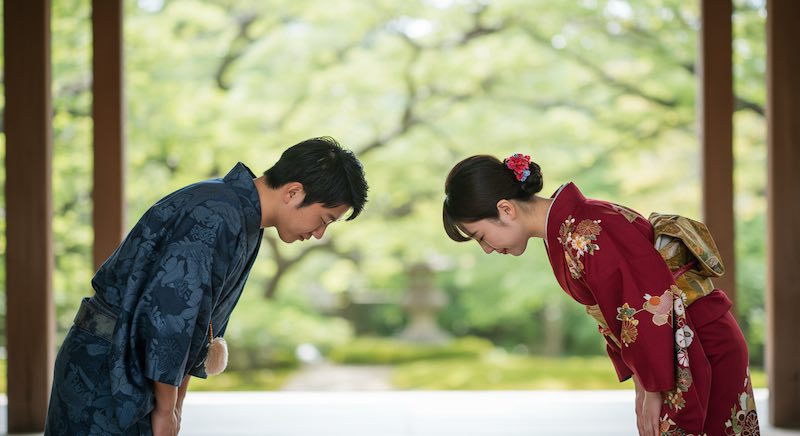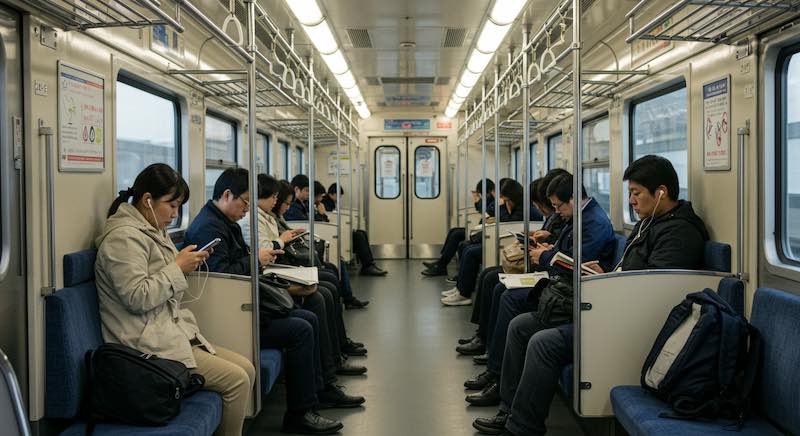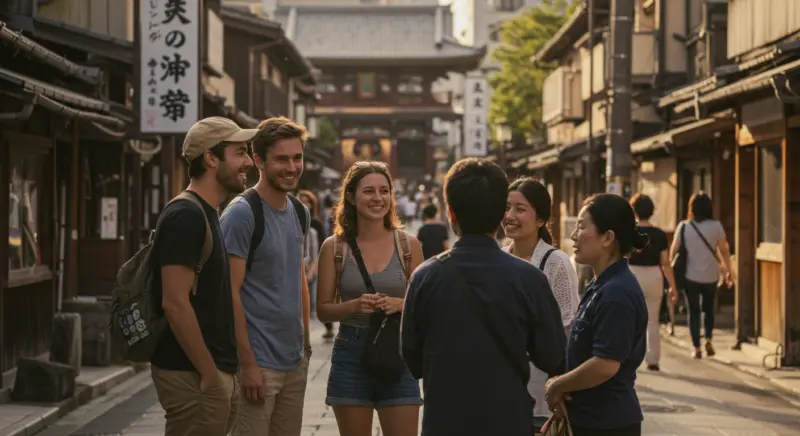Unspoken Rules Foreigners Should Know
Japan’s beautiful landscapes, rich history, and unique culture captivate travelers from all over the world.
However, to deeply understand and truly enjoy its fascinating culture, it’s essential to go beyond superficial sightseeing and understand the unspoken rules and etiquette rooted in Japanese society.
Table of Contents
While Japan is generally tolerant and kind to foreigners, respecting Japanese culture more deeply will make your trip even richer and more memorable.
This article introduces rules that foreigners may find difficult to understand but that most Japanese people follow, as well as specific tips for traveling Japan with grace and respect.
By reading this article, you will be able to enjoy your interactions with locals more smoothly and comfortably without feeling embarrassed in Japan.
The Foundation of Japanese Culture: Understanding “Meiwaku” (Inconvenience) and Japanese Politeness
One of the most important concepts for understanding Japanese social norms is “Meiwaku.”
This is a fundamental principle of Japanese behavior that means not causing inconvenience, trouble, or discomfort to others.
It goes beyond simply avoiding rude behavior and actively considers the comfort and harmony of others.
The spirit of “Meiwaku” permeates all aspects of daily life and forms the basis of a wide range of behavioral norms, such as maintaining quiet in public places, being considerate of others, and adhering to established systems and procedures.
Understanding this concept is key to understanding much of Japanese etiquette.

Consideration in Public Spaces: For Smooth Travel and Comfortable Shared Spaces
Japan’s public transportation system is very efficient and convenient, but there are several unspoken rules for using it comfortably.
Trains and Buses: Quiet and Comfortable Travel Spaces
It is considered virtuous to be quiet on trains and buses.
Loud conversations and phone calls are generally avoided as they disturb other passengers.
While using smartphones and mobile phones is allowed, it’s customary to keep the volume to a minimum and use earphones.
When boarding a train, line up in two rows.
Japanese trains always stop at designated times and places.
When the doors open, let passengers get off before boarding.
Priority seats are reserved for the elderly, people with disabilities, pregnant women, and people with small children.
Even if these seats are empty, be mindful to give them up immediately if someone who needs them appears.
When it’s crowded, be careful that your luggage doesn’t block the aisle or get in the way of other passengers.
It’s expected to manage your luggage with consideration for those around you, such as using overhead racks or placing it compactly at your feet.

Passengers sitting quietly in Japan
General Public Areas: Consideration for Noise and Respect for Personal Space
Not only on trains and buses, but also in public places such as cafes, waiting rooms, and sidewalks, noisy behavior should be avoided.
Refrain from loud conversations or actions that may cause discomfort to those around you.
Especially in recent years with the spread of smartphones, avoid watching videos or playing games at a volume that leaks sound in public places.
It is important to use earphones and be considerate of those around you.
Also, it is important to maintain an appropriate distance from others in public places.
Especially when queuing or in crowded places, try not to get unnecessarily close to others.
Garbage Disposal: Cooperation to Maintain Beauty
Japan is known as a very clean country, and its beauty is maintained by the high awareness of each citizen.
In Japan, garbage must be finely separated for disposal.
Sorting methods differ depending on the municipality, such as burnable, non-burnable, and recyclable waste, so it’s important to check the rules of your place of stay.
Also, although it may seem surprising, there are not that many public trash cans in Japan.
According to a 2023 survey by the Japan Tourism Agency, the number one thing foreign tourists found inconvenient during their trip was “the lack of trash cans.”
Therefore, it is common to carry a small trash bag when going out and dispose of trash properly at your accommodation.
Dining Etiquette: More Than Just Chopstick Use, Table Manners to Convey Gratitude
Dining in Japan is not just a place for nutritional intake, but also an opportunity to enjoy culture and communication.
Basic Table Manners: Words of Gratitude and Correct Chopstick Use
There is a custom of saying “itadakimasu” ( I humbly receive ) before a meal and “gochisousama deshita” ( thank you for the meal ) after eating.
These are important words that express gratitude for the ingredients and the person who prepared the meal.
How to use chopsticks is also important.
Pointing chopsticks at people, stabbing food with them, licking chopsticks, wandering chopsticks (moving chopsticks around over the food), and pulling dishes towards you with chopsticks are considered bad manners.
In particular, sticking chopsticks upright in a bowl of rice is absolutely to be avoided as it is done during Buddhist funerals.
While it is common to enjoy conversation during a meal, refrain from talking loudly or walking around while eating.
Travelers from overseas may not know the correct way to eat unfamiliar Japanese food.
For example, donburi (rice bowl dishes) are eaten without mixing the rice and toppings, and noodles are eaten by slurping.
Table manners may differ depending on the dish. If you are unsure, refer to the people around you or feel free to ask the staff.
Restaurant Behavior: Expression of Order and Gratitude
It is not uncommon for popular restaurants to have lines. Follow the order and never cut in line.
In Japan, there is basically no tipping custom.
Since a service charge may be included or there is a fundamental idea that good service is expected, trying to tip may confuse the other person.
After finishing your meal, it is important to express your gratitude by saying “gochisousama deshita”.
Immersing Yourself in Onsen Culture: Etiquette for Enjoying Public Baths Comfortably
Onsen (hot springs) are a unique cultural experience in Japan. However, as they are public baths, there is some etiquette to observe.
Onsen Etiquette: Common Rules for Relaxation
Before entering the onsen bath, be sure to wash your body thoroughly at the washing area.
This is an important manner to keep the bathwater clean.When entering the bath, do so quietly and slowly, and be careful not to splash water on others.When soaking in the onsen, return the provided chairs and buckets to their original places.
Refrain from talking loudly or running around in the changing rooms or bathing area, and spend your time quietly.
In many onsen, it is considered bad manners to dip towels in the bathwater.
It is common to cover yourself with a small towel when moving around.
More about hot springs here: Japanese Onsen: Exploring Healing and Culture Wrapped in Steaming Mist
Respect for Sacred Spaces: Appropriate Behavior at Temples and Shrines
Japanese temples and shrines are places of history, culture, and faith. When visiting, it is required to act with respect.
Mindfulness at Temples and Shrines: To Show Quietness and Reverence
Walk quietly within the precincts and avoid talking loudly or making noise.
It is also preferable to avoid overly casual or revealing clothing.When visiting, it is common practice to bow once at the entrance and purify your hands and mouth at the temizuya (water pavilion).When putting money in the offering box, do so quietly.Even if photography is permitted, avoid taking pictures inside the main hall or during ceremonies.
Vandalism incidents have occurred at Meiji Jingu Shrine and Yasukuni Shrine, and nuisance acts such as damaging national treasures have been reported at Chion-in Temple and Todai-ji Temple.
These places are sacred to many people and are cultural heritage sites.
Graffiti and vandalism can violate the Cultural Properties Protection Law and are serious criminal offenses.
- For more about Shinto, click here: For more about Shinto, click here
Tips for a Respectful Trip: Small Considerations Make a Big Difference
It is helpful to remember some basic phrases when traveling in Japan.
“sumimasen” can be used in various situations, such as apologizing, expressing gratitude, or attracting attention.
“arigatou gozaimasu” is a basic word for expressing gratitude.
“konnichiwa” is widely used as a daytime greeting.
Also, bowing is a common way to greet and show respect in Japan, but a slight nod is sufficient for foreigners.
In more formal situations, a slightly deeper bow would be appropriate.
When taking photos, be sure to obtain permission before photographing people or private property.
Unauthorized photography may constitute an invasion of privacy.
Things to Absolutely Avoid: Japanese Taboos and Behaviors of Disliked Foreign Tourists
There are several taboo manners in Japan that should absolutely be avoided.
Littering in public places damages Japan’s cleanliness and is highly disliked.
Excessive noise in public places should also be avoided as it disturbs those around you.
Queuing is a basic rule in Japan, and cutting in line is considered very rude.
Loud conversations and phone calls on public transportation are also disliked by many people.
Trespassing on the grounds of someone’s home or private property is, of course, not permitted.
Temples and shrines are sacred places, and acts such as talking loudly, running around, or touching sacred objects without permission should be strictly avoided.
- The problem of overtourism in Japan: Enjoy Japan Quietly: Secrets to Avoiding Crowds
In recent years, with the increase in foreign tourists due to the inbound tourism boom, the nuisance behavior of some tourists has become a problem.
For example, in Gion, Kyoto, foreign tourists ignore “No Entry” signs on private roads, causing trouble for local residents.
At Watatsumi Shrine in Tsushima, nuisance acts such as smoking, littering, and noise by some Korean tourists occurred frequently, leading to a temporary ban on Korean tourists.
The policy has since been changed to prohibit entry to tourists regardless of nationality.
Also, problems such as exceeding the number of booked guests and leaving garbage have been reported at private lodging facilities.
At ryokans (traditional Japanese inns), some foreign tourists have been reported to take home amenities.
Cases have been reported where not only yukata (casual kimono) and towels, but also ashtrays, vases, and even vacuum cleaners and toilet seats were taken.
These behaviors are due to a lack of understanding of Japanese culture and customs, and a lack of consideration.
While Japanese people are generally kind and tolerant, if such nuisance acts are repeated, the impression of all foreign tourists may worsen, and the attitude towards accepting them may change.
- Chinese tourists leave Japan guest house in disarray, sparking price hike proposal
- Angry at Yasukuni Shrine ‘toilet’ graffiti, Japan man posts US$64,000 bounty for vandal’s arrest
Changing Tides: Recent Concerns Regarding the Behavior of Foreign Tourists
Japan has long warmly welcomed foreign tourists, but in recent years, with the increase in tourists, some tourists’ bad manners have become noticeable, and concerns are growing among local residents and tourism industry officials.
Graffiti and vandalism at shrines and temples are prime examples.
The incidents at Meiji Jingu Shrine and Yasukuni Shrine shocked many Japanese people as they showed a lack of respect for Japanese culture and religion.
The example of Watatsumi Shrine in Tsushima shows that the actions of some tourists led to strict measures such as banning entry to tourists of a specific nationality.
Exceeding the number of booked guests, leaving garbage, and noise problems at private lodging facilities not only worsen the living environment of local residents but also damage the trust relationship with the host.
Taking home amenities at ryokans also places a significant burden on the owners.
These examples show the negative impact that the behavior of some foreign tourists has on Japanese society and culture.
It is essential for each individual to act responsibly without taking advantage of the kindness of the Japanese people in order to maintain good relationships in the future.
Deepen Cultural Understanding and Create Memorable Journeys
Understanding and respecting Japan’s unspoken rules and etiquette is not just about avoiding embarrassment. It is a path to understanding Japanese culture more deeply, building good relationships with local people, and leading to a richer and more rewarding travel experience.
When visiting Japan, please refer to the information introduced in this article, always remember to be considerate of others, and try to act with respect.
By doing so, you will be able to truly enjoy your stay in Japan and return home with beautiful memories.
And your actions will have a positive impact on other foreign tourists and help to further deepen the friendly relationship between Japan and the world.










Leave a Reply